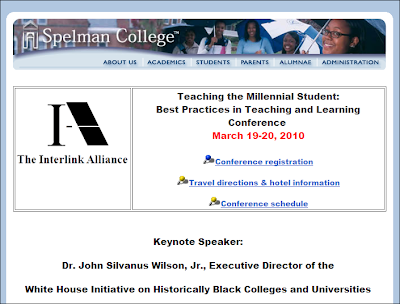here is the link, so you can read the start of the thread:
Thursday, March 18, 2010
Follow up on the Tech, learning and Millennial thread
Read the previous post for details, post your comment here if you are completing your assignment but the page is too slow to load or otherwise makes it hard to post your comment.
Saturday, March 13, 2010
Reflections on technology, learning and the millennial generation.

Note: The task in this assignment is to read through this post. Follow some of the links. Think about the questions, read some of the other student comments, and write up your answers. Remember to sign the top of your comment, so that you can get credit for your answers. Consider also that blog posts, like the projects we produce, are public, and will be read by students, faculty and administrators from a range of colleges and universities.
What does it mean to be a millennial? The Pew Research Center reports on key aspects of the millennial generation. Pew offers a brief survey there that allows you to compare yourself to general patterns in the Millenial generation (according to their research). I scored a 79 on it, placing me in the ‘similar to millennials’ category. The quiz is just an approximation, and the actual survey performed by Pew was much more detailed. Here is the summary of their findings.
Some findings include: Compared to Americans over 30, the millennial generation is more ethnically diverse, under-employed, embrace social technologies more strongly, attain higher average levels of education, express optimism that the government can and should do more to help people.
Findings reported elsewhere on Pew’s site (Social Media and Young Adults) indicate that although millennials are more active on things like FaceBook, they are less active than Gen-Xers in things like blogging. This finding is consistent with a recently published article by Eszter Hargittai (Digital Na(t)ives? Variation in Internet Skills and Uses among Members of the "Net Generation", Sociological Inquiry, 2010) that suggests that millennial college age students are not necessarily more technologically savy than older generations. That is, while a small percentage of new college students might be ‘digital experts’ the vast majority are not experts. In fact, the majority primarily use relatively simple systems, like text messaging and Facebook.
I had come to similar conclusions simply by working with Sociology 101 students at Ohio University. Several aspects of our 101 course this quarter were intended to raise levels of 'tech savy' in ways that are educationally helpful. Recall the illustrations of technologically enhanced collective action described in Clay Shirky’s book (Here Comes Everybody), I believed that as an instructor in 2010 I have an obligation to help develop students' capacity to think, read and write in our increasingly digital world.
One of my goals in Intro to Sociology is to expand awareness of digital tools for creation and collaboration, and to use those tools as integral parts of the learning process.

On March 19th and 20th I will be attending the Interlink Alliance conference on Teaching the Millennial Student: Best Practices in Teaching and Learning. The event will be attended by Presidents, Chancellors, Faculty and key Administrators from schools in the Interlink Alliance: Ohio University, Central State University, Johnson C. Smith University, North Carolina Central University, Spelman College, Virginia State University, Hampton University, and Wilberforce University.
A goal I would like to accomplish through participating in this event is to facilitate discussion of how to structure classes and assignments that help students learn technological skills that will help them succeed in school and in future careers. I also want to help provide evidence about the range of skills that students have, and to think about what faculty can do to encourage students to take on new challenges and develop new skills.
As students of Ohio University, Sociology 101, A2, winter quarter, 2010, you are the experts on teaching and learning practices as they relate to technology and millennial students. This assignment is your chance to share your expertise.
Please post a comment that responds to the following questions:
1. How savy were you with technology coming into the class?
1a. How do you compare to typical millennial students?
1b. Has this changed during the course? If so, how?
1c. Do you foresee any long term educational impacts for yourself
2. Describe particular aspects of technology use in the course that shaped your learning?
2a. How does the use of technology in Soc 101 compare to other courses
2b. What aspects could be improved in either Soc 101 or other courses
3. Consider your own identity, background and educational aspitations.
What general comments do have about technology related teaching practices that can enhance your learning and preparation for your possible career paths?
Wednesday, March 10, 2010
Gapminder Turn-in Thread

Turn in your Gapminder assignment in this thread. There are 4 steps:
1. You need to do the assignment. Instructions:
2. Write up your answers to the task in a word document.
3. Copy and paste the text from your answer to the assignment into your comment.
4. Upload your image online somewhere. I used IMGUR for this example.
5. Include the URL to your image in your comment, like this:
6. Remember to bring a hard copy of your answer and your picture(s) to class on Friday.
Tuesday, March 9, 2010
Jordan's Twitter Account

A couple of weeks ago we talked about role models. I posted an image of Neil deGrasse Tyson, and asked if people knew who he was. Folks didn't know him, be certainly everyone knew who Michael Jordan was. The really cool thing about the image above is that Michael Jordan appreciates Neil Tyson, and a great deal more. Jordan, via his Twitter account, seems like a much more complete role model than his basketball fame would suggest.
Just an interesting connection that I ran across today.
Monday, March 8, 2010
Plenty of Opportunity
 Several folks expressed concern about wanting to finish with a better grade than they currently have. I want everyone to be clear that there is still plenty of opportunity to improve. There are still about 40 pts of extra credit available, plus improvement between the midterm and final, plus the remaining assignments. You can get a rough estimate of you will likely do on the final grade by adding your current score to your estimate of the # of points you expect from the remaining assignments.
Several folks expressed concern about wanting to finish with a better grade than they currently have. I want everyone to be clear that there is still plenty of opportunity to improve. There are still about 40 pts of extra credit available, plus improvement between the midterm and final, plus the remaining assignments. You can get a rough estimate of you will likely do on the final grade by adding your current score to your estimate of the # of points you expect from the remaining assignments. Friday, March 5, 2010
Friday!
Announcements:
- 2 surveys (brandon's facebook survey and Jeannette's a journalism student) for 10 pts extra credit each. If you didn't get it in your email send an email to brandonbrooks1@gmail.com
- Gapminder make-up assignment is due next friday.
- Evaluations for the course can be found on blackboard. Please fill those out
- Group Projects due March 12th!
Have a great weekend!
Thursday, March 4, 2010
Assignment for Tomorrow
Sociology Notes for Thursday, February 3, 2010

Today, we talked about development and social change. Social change is defined as a change in the distribution of resources, goods, roles, ideas or relationships at a large scale. Social change is often related to institutions, rules, laws and infrastructure.
Development is defined as the growth or creation of new and better systems of exchange as well as new and better systems of infrastructure. This allows for improvement in economic, social and bodily well-being.
Tuesday, March 2, 2010
Wikipedia Assignment Turn in Thread

Congratulations! You made it!
When you are done with your Wikipedia editing assignment, write it up and post it in the thread below. Make sure you check out the requirements, but basically you need to include urls to the pages you edited, to your user page, and write up your answers to the questions raised in the assignment description.
See recent thread about the assignment: http://sociologynotescomments.blogspot.com/2010/02/wikipedia-edit-assignment-replacement.html
Monday, March 1, 2010
Notes for Monday, March 1st
Absolute poverty is when individuals do not have the means to secure the basic necessity of life. Relative poverty, however, is when individuals may be able to afford basic necessities, but are still unable to maintain an average standard of living.
Poverty is extremely important because it has repercussions for both the individual and the society. Individuals in poverty experience suffering and the possibility of the risk of ruin. Within society, poverty can lead to disorder, conflict, underproduction, and inefficiency.
Subscribe to:
Comments (Atom)

